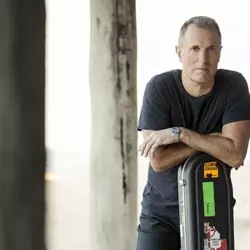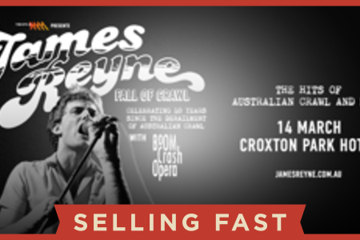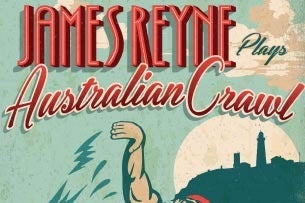 James Reyne
James ReyneAustralian Crawl were one of the preeminent bands of the fertile Oz rock boom of the late ‘70s and early ‘80s – selling millions of records and playing to massive crowds all over the country – yet in the intervening years they haven’t retained the same profile as some of their contemporaries from the era. After their split in 1986 a series of events – including band members passing away, acrimony within the ranks plus a fruitful solo career for frontman James Reyne – transpired to make a full-scale reunion impossible, so fans have had to rely on listening to the old records and dwindling classic radio support to keep Crawl’s music alive and kicking.
Until now. The recent acquisition of EMI – who owned the Aussie Crawl catalogue – by Universal has meant that the band’s music has finally been made available online, and the resultant surge in popularity has meant that after years of pressure to revisit the era, Reyne has acquiesced and is embarking on The Crawl Files Live tour. He’s always kept some Crawl songs in his solo repertoire, but on this tour it’ll be nothing but Aussie Crawl, and delighted fans have been crawling out of the woodwork, stoked to revisit this cherished catalogue.
For the affable Reyne, however, the band’s legacy has been something of an albatross at times, with both fans and critics having proved more reluctant than the singer to leave Australian Crawl and its music behind.
“Nothing against the band or the songs, but..."
“Nothing against the band or the songs, but it’s sometimes frustrating,” he admits. “I’m a songwriter and I like to think of myself as a contemporary artist moving forward, and you sometimes get frustrated when you put a new album out and you go around promoting it and doing gigs, and quite often people just keep harping back to the past – the past, the past, the past, it’s always the past. I feel like I’m always defined by what I was doing when I did my apprenticeship, and I defy someone in any other vocation or job to not be frustrated if you’re chopping down trees or a brain surgeon or a journalist and you’re constantly defined by what you were doing [in your first years out of school] – you’d be hating it.”
Don't miss a beat with our FREE daily newsletter
Yet as Reyne prepares to revisit the Aussie Crawl catalogue in the live realm he readily admits to being surprised at how good some of the stuff he’d forgotten really is. The songs still sound both fresh and sonically unique – were any bands in particular inspiring them when they set out?
“In the era when Australian Crawl started it was a very different music scene, and you built your reputation and your following initially on live performance."
“We had bands that we liked, but I don’t think we were trying to be like anybody,” he ponders. “In the era when Australian Crawl started it was a very different music scene, and you built your reputation and your following initially on live performance. There were a lot of bands at that time – a lot of whom became very big bands and sold a lot of records – so you’d go out there and you’d work a lot. You could work ten or 11 months of the year, six days a week, all over the country and you’d build up these big live followings, then when you released records radio was very supportive so your new single would get added to radio – assuming it was good enough – and that fed into more people being aware of the band, and they’d go out and buy the records too.
“So all we’d do is try to be competitive live. You wanted the songs to make people go off when you were playing them live, because you were always playing these packed, sweaty pubs and you wanted people to go nuts. You needed big, beefy songs and that’s why a lot of songs from that era ended up sounding like that. Plus all of the bands were great playing live – although I had certain frustrations with ours which are well documented, so I won’t go there – and eventually we got good, to the point where I could be proud. We’d be on bills with bands like Midnight Oil and Cold Chisel and The Angels and Split Enz – incredible live bands, seriously great bands – so when you’re sharing stages with them it really raises the bar.”
Unlike a lot of those bands, however, Aussie Crawl displayed a lack of artifice that seemed to endear them to many.
“We never thought of ourselves as rock stars.”
“We never thought of ourselves as rock stars,” Reyne concurs. “We didn’t think we weren’t good, but becoming rock stars was what other people do – we were just average Joes who’d go for a surf or travel around or go to the pub. We liked to have a party and hang around with our friends – we kept all the old friends we had – and we never took it seriously. I mean we took the music seriously, but not all the other stuff that goes with it like rock stardom and things like that, we didn’t even think about it. And we were fairly cynical people, so if someone started to get bigheaded they’d soon be brought down to size.”
It must be nice for Reyne to keep the Australian Crawl legacy alive, and in doing so sustain the memory of guitarists Guy McDonough and Brad Robinson who are no longer with us. “Yeah, I think so,” Reyne reflects. “It keeps it alive and revitalises it, I hope, and we’re doing it with respect. We’ll do it properly and how people remember it. I hope it does keep it in people’s minds – so many people tell me that these songs have legs, maybe they’re right. I can’t be objective about them, but I think if they’re worthwhile songs then they should stay in the zeitgeist.”





















